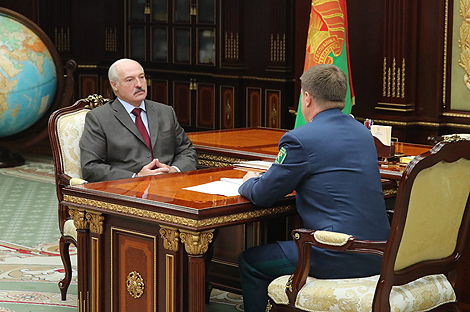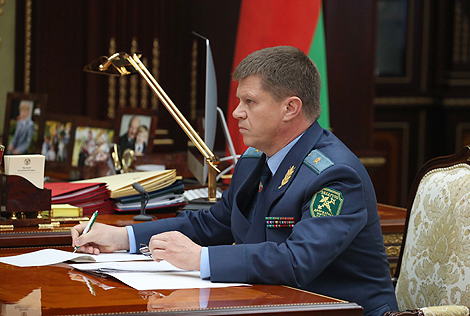Business news
Belarus president blames big Russian companies, high-ranking officials for banned imports
 MINSK, 17 July (BelTA) – Efforts to counteract the import of embargoed products to Russia were mentioned as Belarus President Alexander Lukashenko met with Chairman of the State Customs Committee Yuri Senko on 17 July, BelTA has learned.
MINSK, 17 July (BelTA) – Efforts to counteract the import of embargoed products to Russia were mentioned as Belarus President Alexander Lukashenko met with Chairman of the State Customs Committee Yuri Senko on 17 July, BelTA has learned.
Alexander Lukashenko said: “It is a major headache for us. We do a crazy amount of work for Russia. The customs service and other agencies tell me that quarrels happen all the time over there. Biased articles [in mass media] are frequent. And we are getting reprimanded. Instead of gratitude they often blame us for doing a poor job stopping the embargoed goods.”
The head of state stressed: “Has the problem been resolved? If not, we should speak up about it. Because, according to the security agencies, all the negative processes relating to the banned imports and other matters are handled by Russian companies, sometimes major ones, with big entrepreneurs in positions of power behind them. We should speak about it, too. No need to be shy. Don’t tell the Russian customs service. Tell the government and the president of the Russian Federation so that they could straighten things out. I say it to Putin often. But facts should be presented.”
 The head of Belarus’ Customs mentioned a recent example. “Two trucks travelling with forged documents on the way from Belarus to Russia loaded with the so-called sanctioned goods were stopped on the Mogilev motorway yesterday. A Russian citizen on the international wanted list was accompanying the two trucks. We’ve handled the matter together with police. The citizen has been detained,” said Yuri Senko.
The head of Belarus’ Customs mentioned a recent example. “Two trucks travelling with forged documents on the way from Belarus to Russia loaded with the so-called sanctioned goods were stopped on the Mogilev motorway yesterday. A Russian citizen on the international wanted list was accompanying the two trucks. We’ve handled the matter together with police. The citizen has been detained,” said Yuri Senko.
Alexander Lukashenko responded by saying: “They forge papers, they transport the goods on their own and blame us.”
According to the State Customs Committee, since Russia enforced trade restrictions against individual countries and commodity groups the Belarusian customs service has carried out over 4,700 special raids, with the labor costs exceeding 108,000 man-hours. Some 2,200 administrative violations have been detected. As many as 30 criminal cases have been opened to investigate the illegal transportation of 25,000 tonnes of banned imports.







 print version
print version make home page
make home page add to bookmarks
add to bookmarks

